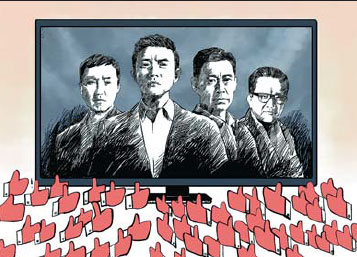Drama's leak shines light on piracy issue
|
The authentic In the Name of People won viewers' support despite pirated versions being available online. Gou Ben / For China Daily |
The 55-episode anti-corruption-themed TV drama In the Name of People has enjoyed top viewer ratings since it started broadcasting on Hunan Satellite TV on March 28. But the full series was illegally released on the internet before even half of it was shown through licensed channels.
The leaked version first appeared online on April 12. Industry insiders said problems could have arisen within the State Administration of Press, Publication, Radio, Film and Television, as the watermark on the leaked version shows it is the sample submitted to the authority for approval.
Li Xuezheng, supervisor of the TV drama, told China National Radio that the case might have been "deliberately organized by a large piracy group. The story behind the leak is definitely more dramatic than the drama itself".
Zhao Zhanling, a researcher at the intellectual property center of the China University of Political Science and Law, said those who released the drama without permission have violated the producer's right of online distribution, and should be subject to civil liabilities.
However, just civil compensation makes for an insufficient deterrent to rampant online copyright violations, said Liu Chuntian, head of the Law School at Renmin University of China.
"The rights owners will suffer huge losses because of the wide distribution of the pirated drama," Liu said, and suggested the use of criminal law against severe infringements.
Hunan Satellite TV spent 220 million yuan ($32 million) to acquire the exclusive rights to broadcast the drama over the next five years. Video website PPTV spent nearly 200 million yuan on the rights to the drama's online streaming and distribution, and then licensed it to a number of other sites such as iQiyi and Tencent.
The leak has had little impact on the TV broadcast's popularity. Statistics from CSM Media Research showed the drama's TV audience rating continued to rise even after the leaked version was available.
However, industry insiders believe the licensed video websites will be the worst hit, as the leaked version will steal online data traffic from them. The total losses for all licensed platforms are estimated at 500 million yuan, according to Hunan-based weekly newspaper Entertainment Express.
Zhang Ji, a lawyer at the Beijing Yingke Law Firm, said the one who leaked the drama has committed a crime if he or she did it for commercial purposes and the pirated version attracts 50,000 clicks.
Li Xuezheng said the leaked version is "very attractive to some people", but voices supporting the genuine version are also strong. Many web users said through social media platforms that In the Name of People is a good drama and deserves protection.
The drama's official account on microblogging platform Sina Weibo posted an announcement by the TV production center of the Supreme People's Procuratorate - the drama's producer - and Hunan Satellite TV, saying that unauthorized online distribution and sales of the drama is in violation of copyright, and that they have reported the matter to the police.
In recent years, many leading internet companies have taken measures to curb online piracy.
Baidu established a special team under its cloud storage service using smart technologies, including image recognition and machine learning, to uncover piracy. Qihoo 360 closed its cloud storage service for individuals in February to avoid distribution of pirated videos.
Streaming platform Youku Tudou has detected more than 160,000 links containing pirated content since the beginning of the year alone.
zhuanti@chinadaily.com.cn



















